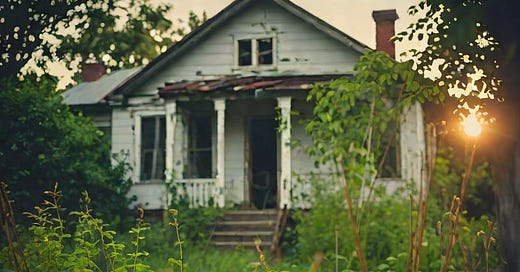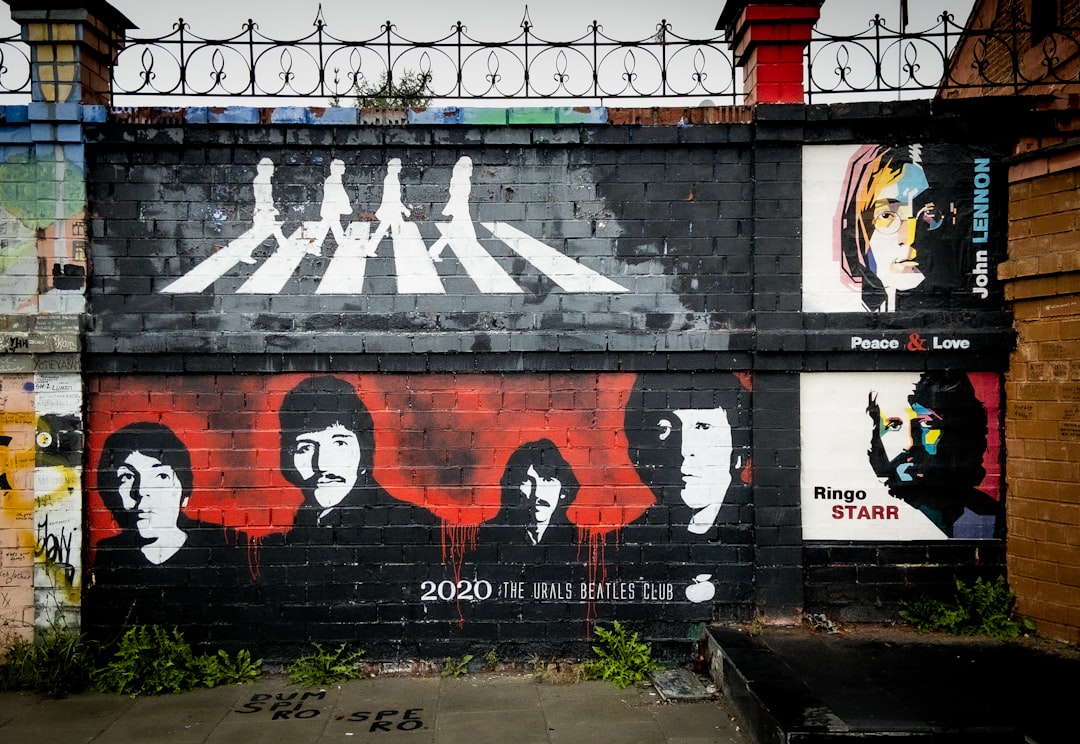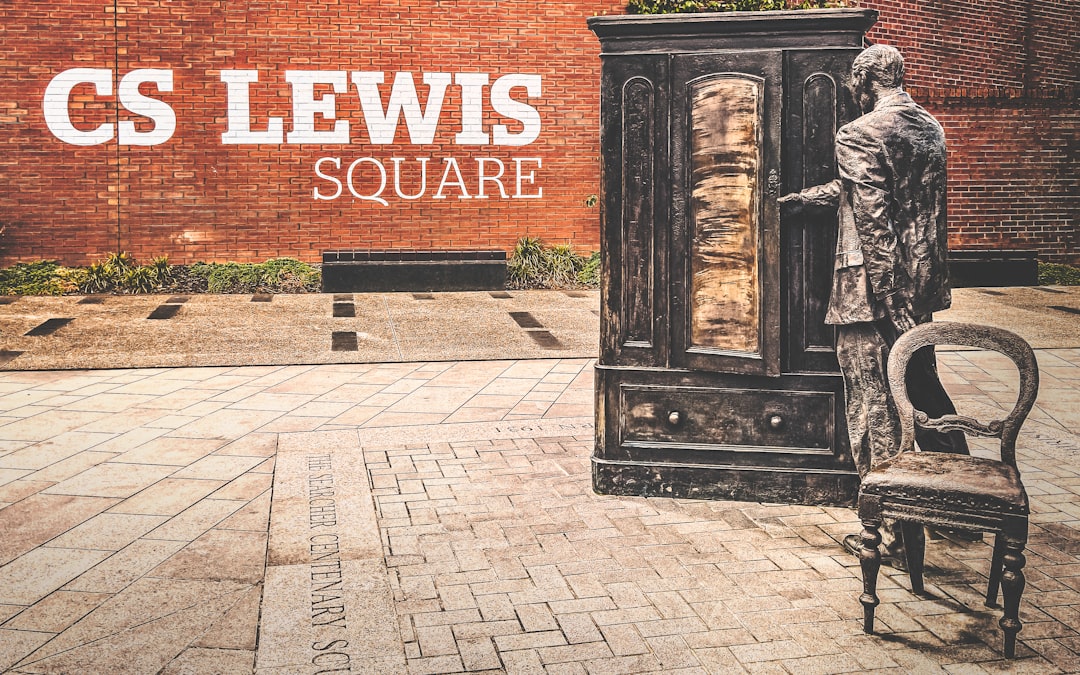The Real Refugee Crisis
How millions of Americans (and Westerners in general) have found themselves surrounded by an alien culture in what used to be their homeland.
America is a nation of refugees — but not in the way the term “refugee” is popularly understood. And the older you are, the more of a refugee you are. Most of us over the age of 40 have, over the course, of our lives, been uprooted and displaced and driven from our native culture by forces beyond our control; we now frequently experience the pangs of what Alvin Toffler labeled “Future Shock.”1 We are refugees, not from a place, but from a Time — from an America that no longer exists.
We form expat communities with others from our generation, with whom we share a stock of cultural references, customs, and expectations. We raise our children in a culture dramatically different from the one we grew up in; consequently, our children are essentially natives of an environment that feels forever foreign to us, and this dramatically deepens the generation gap between us and them. Navigating society can be challenging. In addition to generation gaps, we must overcome additional differences of ethnicity, religion, and national origin. (And given the currently prevailing norms about race and ethnicity, the onus of overcoming these differences has been shifted entirely to native whites, who are the only ones ever blamed when such differences prove insurmountable for anyone involved.) Our government shows more regard for the interests of foreigners (e.g., Ukrainians, Israelis, Palestinians, Somalis, etc.) than it does for our own interests. When our public officials address our concerns at all, it’s usually only to fault us for having them. In light of all this, it’s no surprise that we often feel like foreigners in our own homeland.
The Advent of a New and Alien Civic Religion
Here’s an example of our alienation from our own culture: the language we use to describe the Kalergi-planned,2 replacement-level immigration of third-world hordes into our country. Over the past couple decades, we went from talking about “illegal aliens” to talking about “undocumented workers,” “migrants,” and even “refugees.” Instead of speaking frankly about the problem — which has now morphed into caravans of military-age males from unfriendly nations who should more accurately be described as “invaders” — we are told there is a “refugee crisis” for which the only acceptable, humane response is for us to admit all of them and then pay their living expenses and give them each an allowance like they’re our children.
Since the enactment of the Immigration and Nationality Act of 1965 (one of the Trojan Horse “reforms” of the 60s cultural revolution), America’s demographics have shifted dramatically and probably irreparably, and these demographic changes have accelerated in tandem with the adoption of each new dishonest euphemism for the invaders. As our ability to discuss what was happening changed, what was happening also changed. Guerilla moralists from both the Marxcissist Left (“No human is illegal!”) and the Mega-Corporation-Owned Uniparty (“We need them to do the jobs Americans won’t do!”) worked together to gaslight regular people into believing that their natural desire to preserve their own way of life was somehow a sure sign of deep-seated sinfulness that could only be expiated by complete self-denial. Deathly afraid of being labeled a racist or xenophobe (a.k.a., a sinner), the majority went silent and acquiesced to being replaced.
And of course, this pattern has been the same for a host of other issues. In 2008, the belief that marriage should be limited to the union of a man and a woman was so uncontroversial that even the “progressive” candidate for President, Barack “Communist Trojan Horse” Obama, said that he supported that position (in spite of the questionable gender of his own “wife,” Michelle “Big Mike” Obama). Yet a mere seven years after campaigning on this traditional norm, he ordered the White House to be lit up like a Pride-month rainbow to celebrate the Supreme Court’s decision to create a constitutional right to homosexual marriage . . . and only a few years after that, it became culturally acceptable to deny people the ability to earn a living merely because they refused to entertain the delusions of some psychotic autogynephilic man claiming to be a woman, in spite of his Adam’s Apple and 5-o’clock shadow. We were told the “slippery slope” was just a fallacy, and by the time we realized it wasn’t, our civilization had slid so far into clownworld lunacy that it may never recover.
Don’t Forget the Small Stuff (and It’s All Small Stuff)
Though it is far more obvious with the insane changes crammed down our throats in the political realm, this same pattern has played out over and over again in nearly every area of life, often in ways that are so subtle that they escape notice until after the changes have already been made permanent.
One day, you suddenly notice the absence of something you once took for granted. You stop and think about it, and you realize that the thing actually disappeared quite a while ago, but you were distracted with the busyness of life and failed to notice at the time.
Here’s an example: back in 2010, I was in one of those “closeout” stores that sells steeply discounted items from other businesses’ excess inventory, and I saw a dust-covered sales display with hundreds of DVDs brandishing the “Blockbuster Video” logo. “Oh yeah, I remember that place,” I thought. It had been many years since I had set foot in one, but they used to be everywhere, and going there to rent a movie was practically a weekly ritual for millions of us. Now, I don’t miss Blockbuster Video stores in the slightest; I don’t miss being limited to only those titles that were currently popular or that had been deemed “important” by some pompous movie critic; I do not miss the inferior technology of video cassette tapes and having to “be kind” and “please rewind” and all that; and I most certainly do not miss the late fees that somehow always seemed to appear on your account no matter how promptly you returned the videos you borrowed; so I definitely was not wishing to go back to the old ways of watching movies. But when I saw that pitiful Blockbuster Video display and realized that the video-rental store was forevermore a thing of the past, I felt deeply wistful — not for Blockbuster Video, but for the world of 1990, which Blockbuster Video represented.
By itself, this is probably a trite example. But multiply this one minor change by several thousand other similar changes — and that’s probably a conservative estimate of the number of these changes that have happened over the past 30 years, given the wide-ranging effects of the internet, smart phones, social media, etc. — and you can see that the cumulative effect of all of this has been a radical transformation of the culture.
Sometimes watching old television shows or movies really brings this point home. The other day, I was watching old YouTube videos of the quintessentially 80s comedian Sam Kinison from Late Night with David Letterman and The Tonight Show with Johnny Carson, with Kinison doing bits that would definitely NOT be aired on network television today . . .
. . . And as the YouTube algorithm is wont to do, it led me on a journey down memory lane, through the late 80s and early 90s. Now, I was “multitasking” at the time, listening to the videos and occasionally glancing at the screen while working on other things, as a series of videos played of various comedians and musicians from that era. Suddenly, I stopped whatever else I was doing and focused on the screen when I heard the instantly recognizable guitar intro of Guns ‘n Roses’ Welcome to the Jungle:
Guns ‘N Roses. Now, that takes me back. There was an era, brief as it was, when they were the biggest, baddest band on the planet. And for millions of us who formed our tastes in popular music during those years (roughly 1988 through 1992), that music video was our generation’s equivalent of The Beatles appearing on Ed Sullivan in 1964.3 That song — and the band that created it — suddenly seemed to be everywhere that mattered. What did any of that mean, ultimately? I certainly didn’t know, and I doubt very many other kids really thought much about what it meant either. Looking back, I can only point to a certain rawness and, for lack of a better word, realness that Guns’ N Roses conveyed with their music, a primal energy and anger that captured our inarticulate frustration with life.
Hmmmm . . . Now that is odd. Why would I be nostalgic about a song that reminds me of how frustrated I was with life as a schoolboy? I understand why the mood of Guns ‘N Roses Appetite for Destruction or GNR Lies could seem relevant today: the “longhouse” gynocracy that dominated life in elementary school now seems to have infected the entire culture, including the “adult” world, so the angry and aggressive vulgarity of Guns ‘N Roses (and Sam Kinison) seems like a healthy antidote to the obnoxious Conformmunist piety of the present era. But why would I be nostalgic about hearing expressions of that frustration?
And why was there so much free-floating frustration in the zeitgeist of that era? Wasn’t everything so much better back then? Weren’t we Americans on the cusp of winning the Cold War against the Soviet’s evil empire? And even though something untoward happened in 1971, weren’t we still growing up in an age of material abundance and financial opportunity? So what the hell was wrong with us? Why didn’t we realize how good we had it?
You Do Not Experience Homesickness Because Home Was Perfect
There is a tendency to romanticize the past, and older generations have probably always done that. I know I often do that, even when I know better. And while the general public’s attitudes about things like immigration and gender were probably healthier then (though not as healthy as they would have been in 1940), this was only because the Marxcissists’ cultural revolution had yet to plumb the lowest depths of criminally insane depravity that has pervaded our culture in the 2020s. But the agents of subversion were already there (my grandparents’ generation surely considered GNR and Sam Kinison to be symptoms of cultural decay), spreading and consuming our civilization from within like a deadly cancer.
Reminiscing about the 1980s — or even the 1950s — today is like a man with stage-four cancer wistfully recalling the days when his cancer was only at stage one. Maybe his quality of life was better before his cancer had advanced as far, but he was not healthy. Just turning the clock back, by itself, does nothing except to guarantee that you will eventually end up in the same exact spot you’re in now.
Many Millennials pine for the days before 9/11. This is understandable, but misguided. I remember those days, the era of depressing, darkly-humorous movies like Office Space, Requiem for a Dream, and American Beauty, as well as that trilogy of “Gnostic-ish” movies premised on the belief that our “reality” is an intoxicating illusion created by malicious powers who manipulate our world, and us, for their own benefit, not ours: Dark City, 13th Floor, and The Matrix. Maybe we had a better standard of living then than we do now, at least in terms of inflation-adjusted dollars, but something was very clearly rotten in America.
Go back even further than that, and you find people, especially artists and the spiritually-minded, talking about how the world around them had gone fundamentally wrong. The happy innocence of the 1950s? You have the original Twilight Zone, a series that shone a spotlight into the inky darkness beneath the veneer of modern civilization, launching to much acclaim in 1959, the same year that Kurt Vonnegut published his novel Sirens of Titan, in which the characters discover that much of human history has been shaped by aliens manipulating our species for their own benefit. Maybe that existential angst had not yet reached the “normies,” but for those with eyes to see, the postmodern world was essentially an unnatural prison for the human soul — a prison bedecked with all the latest material comforts and fashionable decorations, but a prison nonetheless.
How about those heady post-World War II years, when American triumphalism was at its zenith? Well, today the most famous movie from 1946 is probably It’s a Wonderful Life, which reaches a feel-good and inspiring resolution, but only after the main character has to be dissuaded from suicide by heavenly intervention. But great as it was, It’s a Wonderful Life did relatively poorly at the box office and was beaten out at the Oscars by The Best Years of Our Lives — and if you’ve seen that movie, you know that the title is meant ironically. It was a movie about World War II veterans struggling to readjust to civilian life, very similar thematically to the distressing movies that would be made a generation later about troubled Vietnam Vets. The Best Years of Our Lives certainly has none of the cheerleading about the “good war” that seems to have developed later, retrospectively.4
No matter how far back you go, the Past clearly was not perfect, so why do so many of us feel so sentimental about it? Probably for two reasons. First, because we all need a “home.” On a biological and psychological level, we need someplace where we belong, where we can be amongst our fellow natives, where we don’t have to worry about how our words and actions may be misinterpreted or used against us by people belonging to a different culture. Everyone craves this naturally, but only whites are demonized for it. Second, we feel sentimental about the Past because we know that something deeper is missing from the Present, and we scour the Past, the only other Time we have any conscious knowledge of, for signs of what we presently lack. Unfortunately, what we’re now missing from our culture has been missing for a long time, longer than any of us have been alive.
You Experience Homesickness Because Something Is Missing from the Present
And what do we presently lack? As G.K. Chesterton observed in his book (from 1905!) What’s Wrong with the World, our culture lacks any kind of unifying vision of what’s Right and Good. Nearly everyone believes the world has gone wrong, but almost nobody can agree on what would make the world right. The old narratives are exhausted and have been stretched past the breaking point of absurdity. What comes next, and what we can do in the meantime, are themes that I will explore in a separate post (or posts).
For now, let me just point out that if you feel disoriented and disconnected from what’s real, that is a normal reaction to a profoundly unnatural state of affairs. You are experiencing severe Future Shock — yes, it is a thing, every bit as real as the culture shock you would experience if you traveled down the rabbit hole and got stuck in Wonderland, in a surreal realm where everything means the opposite of what you think it means. Moreover, that sense that everything is “fake and ghey” is your soul letting you know it’s still alive, reminding you that you are not one of the Hylics/NPCs. So that sense of alienation is a good thing, because it shows you are psychologically healthy, since you are feeling a natural emotional response to profound changes in your environment.
It is important to keep in mind that in our state of alienation and disorientation, we can be more vulnerable to false messiahs promising a snake-oil balm for our troubled minds. Certainly, the ponerogenic elites have taken advantage of the public being dazed and confused from Future Shock, and rather than trying to optimize society for the creation and preservation of whatever promotes human flourishing, they have engineered our institutions to maximize the precise opposite: chaos, impoverishment, dysfunction, and suffering. May the real God repay them for their crimes.
But there is good and encouraging news: as I noted in my post The Good that Evil Does5, more and more people are acknowledging the spiritual discontentment and ennui that they feel. And this acknowledgement, in turn, makes them more willing than ever to ask big, crazy-sounding questions about the true nature of our “reality,” and about themselves. As we careen towards an imminent inflection point (followed by whatever comes after that), this trend of spiritual awakening will doubtlessly continue, if not accelerate quickly.
Jesus said, “Let him who seeks continue seeking until he finds. When he finds, he will become troubled. When he becomes troubled, he will be astonished, and he will rule over the all.” (Coptic Gospel of Thomas)6
Culture shock is what happens when a traveler suddenly finds himself in a place where yes may mean no . . . It is what happens when the familiar psychological cues that help an individual to function in society are suddenly withdrawn and replaced by new ones that are strange or incomprehensible . . .
Future shock is a time phenomenon, a product of the greatly accelerated rate of change in society. It arises from the superimposition of a new culture on an old one. It is culture shock in one’s own society. But its impact is far worse . . . most travelers have the comforting knowledge that the culture they left behind will be there to return to. The victim of future shock does not.
Toffler, Alvin. Future Shock. Bantam Books, 1971.
In case you’re interested in my musings about popular music and why I believe it peaked in the 1960s and has been in decline ever since:
Why Popular Music Peaked in the 1960s
I have a theory about why popular music peaked in the 1960s and has been in decline ever since, with an especially precipitous drop-off in quality around the mid-1990s. I don’t have anything like the technical knowledge or training of a Rick Beato or
The development of the narratives about World War II and the Holocaust raises some interesting questions, as these narratives do not seem to have emerged organically or even to have been present prior to the late 1960s; this is a difficult topic fraught with all kinds of political “third-rails,” but
does an admirable job writing about it in his series Transed and Nationless: the Post-Hitler West, which I cannot recommend highly enough:The Good that Evil Does:
The Good that Evil Does
“So what’s your philosophy?” is an odd question — odd because I have never known how to answer it. Usually, when someone asks you for “your philosophy,” they are asking you for a coherent set of affirmative answers about how to achieve success and derive a sense of purpose in one’s life. Unfortunately, few modern philosophers have even attempted anything remotely like this (preferring instead to play silly word games with each other). Even the Ancients, who did attempt such answers, and who came nearer to providing them than anyone in the modern era, were usually at their best when they were asking questions, rather than stating their conclusions.
Coptic Gospel of Thomas. Translated by Thomas O. Lambdin.










Until recently, I never understood people that romanticize high school. My high school experience wasn't bad at all, but the ensuing decades were significantly better. Why would I want to go back?
But I kind of get it now. How's this for privilege: until COVID, my life generally improved year after year. Nothing is linear, of course, but the general trend was up. Now I look back at 2019 with a melancholy wistfulness that I believe is called "nostalgia."
I don't actually want to return to 2019, not really. I'd be living in a web of lies, and this time I'd be aware of it; I don't think my mind can withstand that much cognative dissonance. But the blend of security and possibility that 2019 held - I miss that. Part of aging, I suppose, is reckoning with the reality that at some point that secure station with seemingly endless future possibilities - that home - isn't coming back.
The truth will set you free, it's said, and I believe it. But what goes unsaid is that once free there are only a few paths worth taking, and none of them lead backwards. And so we travel onward, knowing we can't recreate what we've lost, but with a growing determination to make the most of the path we're on.
Thank you for your piece - I always appreciate a good reflection that prompts me to do the same.
I and many of my friends refer to ourselves as "refugees", and only half in jest. We grew up in different parts of the country, but we all agree that the places we remember from the past are dead and gone. There was nothing left for us in those places. It's a difficult adjustment to make, and, for a while, you really feel like a man out of both time and space, but thankfully, as you said, there are other expats, and I was fortunate to meet a lot of them, and they continue to come at pace.
You're right about home not needing to be perfect to be homesick for it. I was raised in the most cookie-cutter, soulless suburb imaginable. It was the quintessential place to buy in and sell out, as they say. The most culture we had were chain restaurants and groups of bored, schlubby middle-aged dads that would get together, dust off their instruments, and play old Boomer rock staples at the local watering holes on Friday nights. It was a decent place to grow up, but I lived there in my early twenties and couldn't have resented it more. For a young person, unmarried and unattached, it couldn't have been more of a dead-end place. But, at the same time, I go back and... it's still safe, overwhelmingly, and still affluent, too, and, unlike most places in the country, growing more so as more and more people flee the nearby cities. However, it certainly doesn't look like the place I grew up in. All the new construction is dreadfully ugly, modernist, Apple Store-chic crap, and all the new houses are cheap, ugly little boxes that are really just four walls of vinyl siding masquerading as a house (but still cost $600,000!) You go to the Costco and, looking and listening to the people around you, you'd think you'd somehow teleported to Bangalore. But, I think Bangalore is probably preferable to some of the nearby towns, which look more like Guatamala or Honduras every passing year. If I learned anything from living in a big city for a while, it's that there's an unspoken value that so many pretend not to know to being surrounded by people who speak the same language. How can you even form a community if you can't even speak to your neighbors? And, yes, I know - you can't, and that's the point. You mentioned the Kalergi Plan by name, so, you already know that.
Anyways, that's enough from me. Great read - always glad to know I'm not the only one who feels like an exile in my own country.